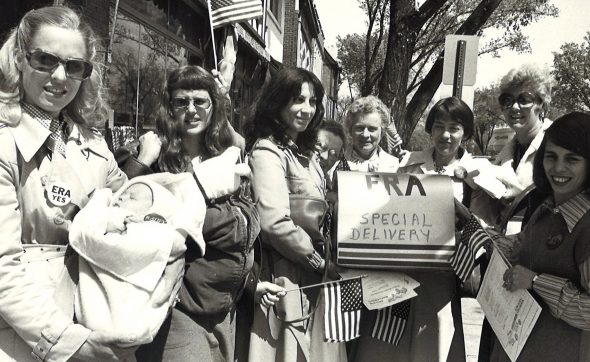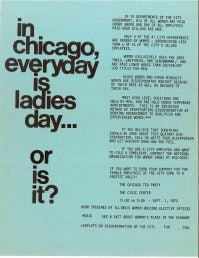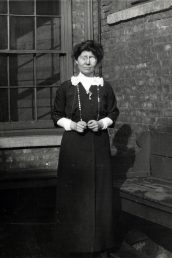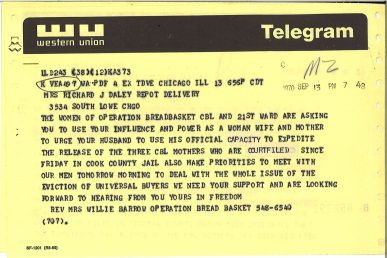Students in virtual course delve into archives to analyze role of women in politics in 20th century Chicago

A University of Illinois Chicago honors-level online course will allow students to analyze the rich history of women during 20th century Chicago politics and will allow them to interact with people who created some of the documentation.
The UIC course, Women and Politics in 20th Century Chicago, is being presented during the spring semester by David Greenstein, lecturer in Special Collections and University Archives.
The course utilizes materials from the University Library’s special collections including compilations from the Chicago chapter of the National Organization for Women (Chicago NOW), the League of Women Voters of Chicago, Jane Addams Hull-House Settlement, the Daley Family and others, said Greenstein.

The 24 students enrolled in the course examine the history and politics of women and gender in Chicago during the 20th century. Themes covered include progressive reform, labor, health and reproduction, sexuality, women’s liberation and the Equal Rights Amendment.
The class is part of a general education requirement and is open to students on an introductory level. Students will be able to learn about the women’s movements in Chicago, how to conduct archival research and how to use a digital publishing format to present the results of that research.
“The collections become great resources to build a class around,” Greenstein said.
“The idea is to take some of our collection materials and some of the individuals who participated in these movements and create new ways for students to engage with them. I think the main thing I want them to get out of the class is that they can use this kind of research with Special Collections and Archives to investigate questions that are important and interesting to them.”
Over the years, the library has been using the collections to create exhibits in the library. Previous exhibits include 50 years of Chicago NOW at UIC and the Equal Rights Amendment (ERA) campaign in Illinois.
But with COVID-19 forcing classes and libraries to go remote, the class and exhibits are virtual. Students are able to use the library’s digitized collections as they analyze various topics and themes.

The class began looking at the early 20th century by focusing on the collections involving Jane Addams Hull-House and other settlements at the time. The Jane Addams Hull-House Museum is located in two original settlement house buildings on the UIC campus. In addition, the class will analyze the early influence and the political engagement of groups in Chicago, such as the Women’s City Club of Chicago and the League of Women Voters.
The class will also look at the 1960s and 1970s and how medical advances helped to trigger the sexual revolution which also led to more women in the working world. Among items looked at will be previous “Help Wanted” advertisements in newspapers which had segregated listings for women and men. Pressure from women’s groups eventually caused the newspapers, including the Chicago Tribune, to integrate the listings.
The class will utilize a digital publishing software called “Scalar” that is optimized for creating online academic publications or online exhibits. The class will use it to create a final project which may take the form of timelines, web pages, or websites, said Greenstein.
“Instead of doing a traditional paper, students will create exhibits using this platform as well,” Greenstein said. “They will get to see the products of each other’s work so it will make it much more interactive and collaborative with the whole class even though we’re not meeting in person.”

Elizabeth Murphy, a freshman at UIC majoring in psychology, said she was most excited about the class because, in much of history, women’s roles have tended to be ignored.
While she would prefer a face-to-face format, she’s looking forward to when she and others can return to the archives.
“What made me most excited for this class was that it was my first opportunity to take a course specifically about women in history,” Murphy said. “I really enjoy learning about female pioneers and activists.”
Mary-Ann Lupa, who served as Chicago NOW president between 1971 and 1973, will be taking part in the class through virtual meetings with students to discuss their work and the documents that have been donated to the UIC archives. Lupa said students will get a sense of what they had to go through.
“Besides the discovery of authentic research on a social movement that changed peoples’ lives, I would hope students gain a realization that community organizing is time-consuming, relentless work, particularly before cyber communication,” Lupa said.
Joining Lupa to discuss their work with the students will be Wilma Stevens, who was Chicago NOW president in 1975 and 1976. She wants students to know that it took not only “painstaking organizing,” but also creativity and humor to address the issues that prevented women from achieving equal opportunity.
“It’s easy to take rights and privileges for granted if you don’t know how hard they were to win,” Stevens said. “Understanding the difficulty of the struggle underscores the value of the achievement.”
For more information about Special Collections and University Archives, visit library.uic.edu/special-collections-university-archives.
